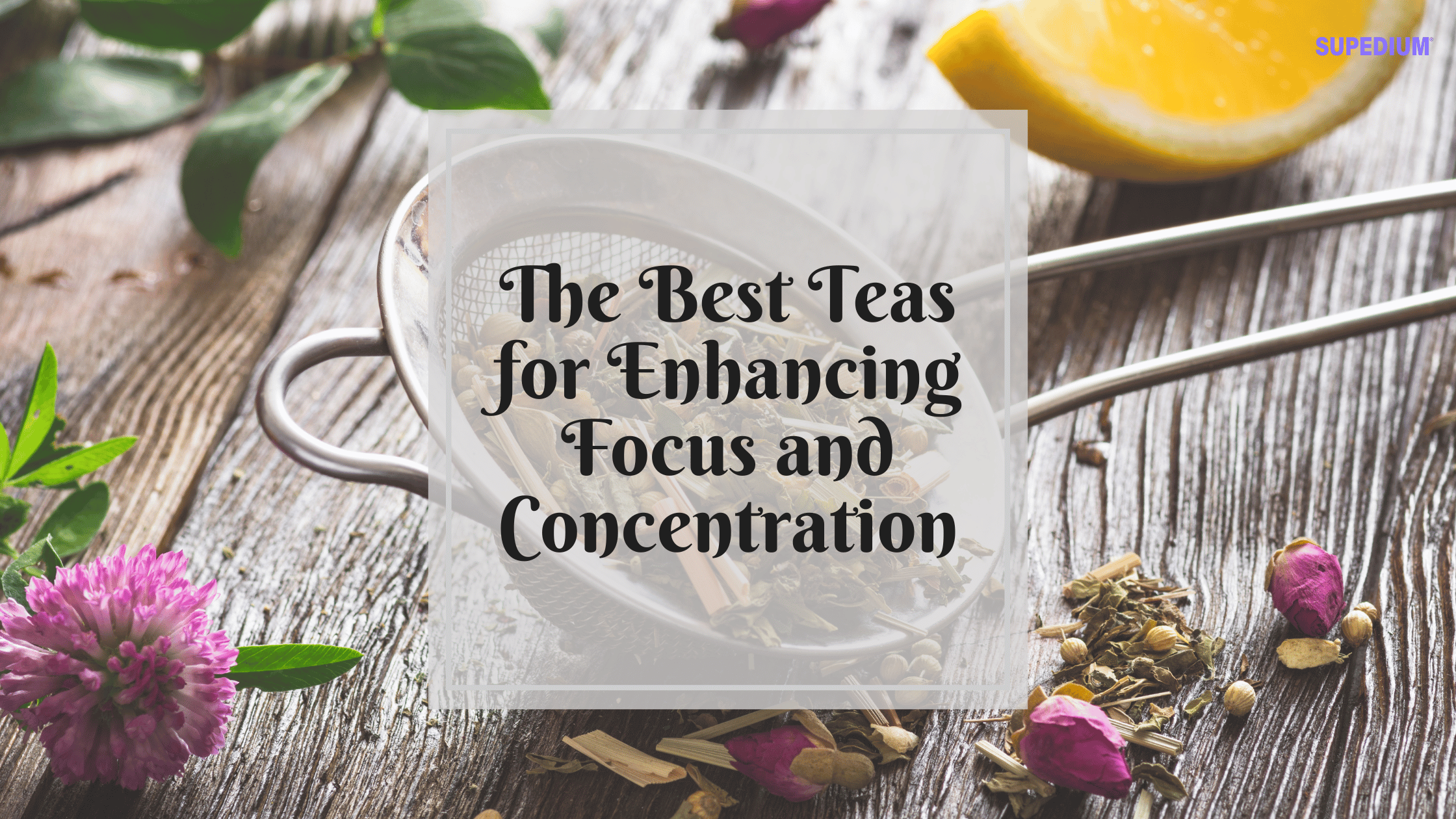Table of Contents
- 1 Understanding How Tea Affects Focus and Concentration
- 2 The Best Types of Tea for Focus and Concentration
- 3 Tea Blends for Enhanced Focus and Concentration
- 4 When to Drink Tea for Focus and Concentration
- 5 Additional Tips for Enhancing Focus with Tea
- 6 Potential Side Effects and Considerations
- 7 Conclusion
![]()
Maintaining focus and concentration is essential for productivity, whether at work, in school, or during daily tasks. Many factors can impact our mental clarity, from stress and fatigue to poor diet or lack of sleep. Fortunately, tea offers a natural, soothing solution to support cognitive function and keep the mind sharp. Certain teas contain compounds known to improve mental alertness, reduce stress, and boost overall brain health. In this article, we will explore the best teas for enhancing focus and concentration, their benefits, and how they work.
Understanding How Tea Affects Focus and Concentration
Caffeine and L-Theanine
The key compounds in many teas that enhance focus are caffeine and L-theanine. Caffeine is a natural stimulant that helps to improve alertness and focus by blocking adenosine receptors in the brain, which are responsible for inducing feelings of tiredness. The result is heightened awareness and attention. However, caffeine can sometimes cause jitters or anxiety, especially in large amounts.
This is where L-theanine, a unique amino acid found primarily in green tea, comes into play. L-theanine promotes relaxation without causing drowsiness. It also helps moderate the stimulating effects of caffeine, providing a smoother, more sustained energy boost and improving cognitive performance. Together, caffeine and L-theanine create a balanced effect, enhancing focus while reducing the anxiety or nervousness that excessive caffeine can cause.
Antioxidants and Neuroprotective Compounds
Teas are rich in antioxidants, particularly polyphenols, which play a crucial role in protecting brain cells from oxidative stress. Oxidative stress can contribute to cognitive decline and mental fatigue. Some teas, like green tea, contain compounds that support neuroplasticity, which helps the brain adapt and form new connections—key for learning and memory retention.
Adaptogens in Tea
Many herbal teas contain adaptogens, herbs known for their ability to help the body manage stress and maintain balance. Adaptogens can improve mental clarity by reducing the effects of stress and anxiety, which are often major contributors to lack of focus. Some adaptogens also support the adrenal system, providing steady energy and improving concentration over the long term.
The Best Types of Tea for Focus and Concentration
1. Green Tea
Benefits: Green tea is one of the most popular and effective teas for improving focus and concentration. It contains moderate caffeine and high levels of L-theanine, providing a smooth, calm energy boost without the jitteriness that often accompanies coffee or stronger teas. The combination of caffeine and L-theanine helps improve cognitive function, attention, and memory.
How it helps: Green tea provides a balanced energy boost, improving mental clarity without overwhelming the system. It’s especially useful when you need sustained focus for tasks like reading, studying, or problem-solving.
Best Varieties:
- Matcha – A finely powdered green tea known for its concentrated antioxidants and a stronger focus-enhancing effect.
- Sencha – A popular green tea with a delicate flavor and moderate caffeine content.
- Gyokuro – A high-quality Japanese green tea that is rich in L-theanine and provides enhanced focus.
2. Black Tea
Benefits: Black tea contains a higher caffeine content than green tea, making it a great option for people who need a stronger energy boost to improve focus and productivity. Black tea can help improve mental alertness and concentration, making it ideal for longer tasks or during periods of intense focus.
How it helps: The higher caffeine content in black tea provides a sharp, quick energy boost that can help you stay alert for hours. This makes it suitable for tasks that require sustained attention, like writing, meeting deadlines, or presentations.
Best Varieties:
- Assam – A strong, malty black tea that provides a robust caffeine boost.
- Darjeeling – A more subtle black tea, often referred to as the “champagne of teas,” with a mild stimulating effect.
- Earl Grey – Flavored with bergamot, Earl Grey is perfect for both a mental lift and a fragrant experience.
3. Oolong Tea
Benefits: Oolong tea lies somewhere between green and black tea in terms of caffeine content and flavor. It provides a moderate level of stimulation, making it an excellent choice for maintaining focus without the risk of overstimulation.
How it helps: Oolong tea is ideal for those who want a steady, balanced energy release throughout the day. The moderate caffeine content offers enhanced cognitive performance without the crash often associated with stronger caffeinated drinks.
Best Varieties:
- Tie Guan Yin – Known for its floral, fresh flavor, this tea provides a gentle mental boost.
- Wuyi Rock – A more robust oolong with a rich flavor, known for its steady energy release.
4. Peppermint Tea
Benefits: Peppermint tea is naturally caffeine-free and provides a refreshing, stimulating effect. Its invigorating aroma and taste help improve mental clarity, stimulate the brain, and reduce feelings of fatigue.
How it helps: Peppermint has been shown to enhance memory retention and concentration by increasing alertness. It’s an excellent option when you want to boost focus without the need for caffeine. Peppermint tea also helps relieve mental fatigue, making it great for late-afternoon slumps.
Best for: Mental clarity and fresh energy without caffeine.
5. Ginseng Tea
Benefits: Ginseng is an adaptogenic herb known for its ability to increase energy, reduce stress, and improve cognitive function. Ginseng tea can help boost focus, concentration, and mental performance, making it a great choice for studying or completing important tasks.
How it helps: Ginseng works by supporting the adrenal system, helping the body respond better to stress and promoting mental alertness. It is known to help increase blood flow to the brain, improving focus and memory retention.
Best for: Long-term cognitive support, particularly when mental performance is needed for several hours.
6. Bacopa Tea
Benefits: Bacopa, a herb commonly used in Ayurvedic medicine, has been shown to improve memory, learning, and cognitive function. It is especially beneficial for long-term mental clarity and focus.
How it helps: Bacopa works by reducing mental fatigue and enhancing neural communication in the brain. It has been traditionally used to support brain health and reduce anxiety, making it an excellent choice for sustained focus.
Best for: Cognitive improvement and memory enhancement over time.
Tea Blends for Enhanced Focus and Concentration
1. Matcha and Lemon Balm
Combining matcha, with its potent caffeine and L-theanine content, and lemon balm, a herb known for its calming effects, creates a perfect balance for focus. This blend boosts cognitive function while reducing anxiety and stress.
2. Peppermint and Rosemary
Peppermint enhances alertness, while rosemary has been linked to improved memory and cognitive performance. This blend promotes focus and helps with mental clarity during long study sessions or work hours.
3. Ginseng and Green Tea
A combination of ginseng’s adaptogenic properties and green tea’s balanced caffeine content helps keep your brain sharp while reducing stress. This blend offers sustained focus and energy throughout the day.
When to Drink Tea for Focus and Concentration
Morning
Starting the day with a cup of green tea or black tea can help boost focus and prepare the mind for the tasks ahead. These teas provide the energy needed to wake up and begin the day with clarity.
During Work or Study
Teas like oolong or peppermint provide steady energy for long work or study sessions, keeping you focused without overwhelming your system with excessive caffeine.
Before or During Meetings
Drinking matcha or ginseng tea before a meeting can help you stay alert and sharp, improving your communication and performance.
Afternoon Slump
If you’re feeling mentally fatigued in the afternoon, a cup of black tea or ginseng tea can revive your focus and help you power through the rest of the day.
Additional Tips for Enhancing Focus with Tea
Creating a Tea Ritual
Making tea-drinking a mindful ritual can also enhance focus. Taking a break to prepare and enjoy tea allows you to center your thoughts, manage stress, and return to your work with renewed mental clarity.
Combining Tea with Other Healthy Habits
Tea can be more effective when paired with other healthy habits like staying hydrated, eating a balanced diet, and exercising regularly. These habits support brain health and make it easier to maintain focus.
Choosing the Right Tea for Your Needs
Pick your tea based on the task at hand. For intense focus, black tea or green tea might be best. For creativity and mental clarity, consider peppermint or ginseng tea.
Potential Side Effects and Considerations
Caffeine Sensitivity
If you’re sensitive to caffeine, choose teas with lower caffeine content, like green tea or herbal teas like peppermint. Drinking too much caffeine can lead to nervousness, anxiety, or digestive issues.
Herbal Tea Interactions
Some herbal teas, particularly ginseng or bacopa, may interact with medications or conditions. It’s always a good idea to consult with a healthcare provider if you are on medication or have any health concerns.
Moderation
While tea can be an excellent tool for enhancing focus, moderation is key. Too much caffeine can lead to dependence, and overconsumption of certain herbs can have unintended effects.
Conclusion
Tea is a natural, enjoyable way to enhance focus and concentration. Whether you prefer the steady energy from green tea or the mental clarity from peppermint tea, there’s a perfect option for every need. By experimenting with different teas and incorporating them into your daily routine, you can experience the cognitive benefits they offer while improving your overall well-being.
Share This





Be the first to comment